|
|
|
Sort Order |
|
|
|
Items / Page
|
|
|
|
|
|
|
| Srl | Item |
| 1 |
ID:
087306
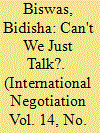

|
|
|
|
|
| Publication |
2009.
|
| Summary/Abstract |
The international community has been increasingly interested in the ways by which external actors help end civil conflicts. This study compares and contrasts the conflicts in Sri Lanka and Indonesia (Aceh) in order to understand why international intervention has failed in Sri Lanka but has been successful in Aceh. In Sri Lanka, the intensely fractured nature of domestic politics has been one of the most significant obstacles to successful peace talks. Although international intervention has become necessary to overcome the trust barriers between the two parties, it is seen as a threat to national sovereignty and therefore rejected. In contrast, the democratization process in Indonesia created new opportunities for peace. The political will of principal actors and their receptivity to external assistance enabled a peace agreement in 2005. The findings of this study show that both domestic political consensus and a supportive international environment, which protect the reputational concerns of the negotiating state, are necessary for resolving protracted ethnonational conflicts.
|
|
|
|
|
|
|
|
|
|
|
|
|
|
|
|
| 2 |
ID:
091069
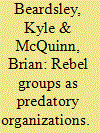

|
|
|
|
|
| Publication |
2009.
|
| Summary/Abstract |
In this article we propose a new typology for insurgent groups to explain why in such remarkably similar conflicts-Sri Lanka and Aceh-the impact of the 2004 Indian Ocean Tsunami was so different. We argue that two principal factors shape all rebel groups by defining their incentive structures: the efficiency of the return on investment of the primary source(s) of support and the group's territorial objectives. The former factor is especially strong in explaining the different choices made by the LTTE and GAM. In Sri Lanka, the availability of lucrative resources outside the country has made the LTTE leadership inimical to compromise, threatened by relief aid, and less reliant on the local population. Lacking access to such high-return funding sources, GAM on the other hand was more closely linked to the needs of the local population and found greater value in both outside aid and a comprehensive settlement.
|
|
|
|
|
|
|
|
|
|
|
|
|
|
|
|
| 3 |
ID:
080787
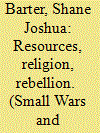

|
|
|
|
|
| Publication |
2008.
|
| Summary/Abstract |
A clear understanding of what creates a conflict is central to building a lasting peace. This paper targets two common misconceptions which cloud analyses of the recent separatist conflict in Aceh. First, the conflict was not about oil. Resource curse theories help explain the creation of the Free Aceh Movement (GAM), but cannot explain why the conflict remained limited for several years. The lessons here are that what motivates a conflict varies over time and across groups. Second, despite Acehnese history, identity, and global trends, the conflict was not marked by Islam. Instead, the GAM promoted ethnic nationalism and downplayed religion to sustain the conflict and their control of it. The lesson here is how leaders can shape, but cannot determine the identity of movements. Beyond these two misconceptions, I move towards explaining the causal mechanisms of the Aceh conflict and assessing this model in light of post-Tsunami developments
|
|
|
|
|
|
|
|
|
|
|
|
|
|
|
|
| 4 |
ID:
102878
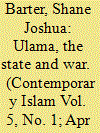

|
|
|
| 5 |
ID:
102933
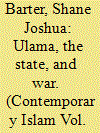

|
|
|
|
|
| Publication |
2011.
|
| Summary/Abstract |
In recent years, much has been said of the relationship between the headmasters of Islamic boarding schools (ulama), the state, and war. Hoping to clarify how ulama behave in times of war and why they react as they do, I look to the recent secessionist conflict in Aceh, Indonesia. Based on extensive village fieldwork, I find that in response to the conflict, Aceh's ulama were divided; some supported the rebels, some supported the state, and some remained neutral. These positions were largely predicted by combatant control, a pragmatic response to conflict dynamics. Sub-regional comparisons, temporal comparisons, and interviews suggest that while many ulama sided with power, they also sided against human rights abuses, a concern for social justice which may be rooted in religious sentiment after all.
|
|
|
|
|
|
|
|
|
|
|
|
|
|
|
|
|
|
|
|
|